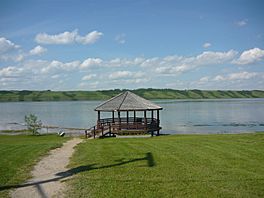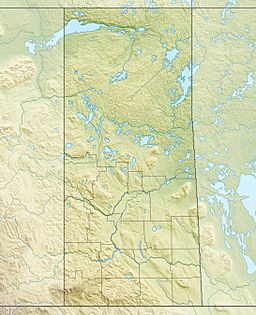Little Manitou Lake (Saskatchewan) facts for kids
Quick facts for kids Little Manitou Lake |
|
|---|---|

Manitou Beach
|
|
| Location | Saskatchewan |
| Coordinates | 51°44′N 105°30′W / 51.733°N 105.500°W |
| Type | Endorheic |
| Primary inflows | None |
| Primary outflows | None |
| Basin countries | Canada |
| Surface area | 13.4 km2 (5.2 sq mi) |
| Average depth | 3.8 m (12 ft) |
| Settlements | Manitou Beach |
Little Manitou Lake is a very special saltwater lake in Saskatchewan, Canada. It is located about 120 kilometers (75 miles) southeast of Saskatoon. This unique lake was formed by melting glaciers during the last ice age.
The lake gets its water from underground springs. Its water has a lot of minerals, like sodium, magnesium, and potassium salts. Because of this, it is called an endorheic basin, which means water flows in but does not flow out to other rivers or oceans.
The water is very salty, about half as salty as the Dead Sea. This high salt content makes it easy for people to float! You won't find many fish here, though. The water is so salty that only tiny creatures like brine shrimp can live in it.
Contents
History of Little Manitou Lake
Ancient Healing Waters
For a long time, even before the 1900s, local Indigenous people used Little Manitou Lake. They believed its waters had special healing powers. They even named the lake after the spirit Manitou.
One story tells of some Assiniboine people who were very sick. They supposedly got better after drinking and bathing in the lake's water. This belief in the lake's healing abilities made it a significant place.
A Popular Tourist Spot
In the early 1900s, Little Manitou Lake became a popular place for tourists. People came to enjoy its unique mineral waters. Even during tough times like the 1930s Great Depression, it remained a resort.
Since the late 1980s, the lake has become even more popular. Many visitors come to experience the water's buoyancy, which lets you float easily. They also come for the claimed health benefits of the minerals.
Arts and Culture at Manitou Beach
The town of Manitou Beach, right by the lake, has become a hub for artists. A group called "Spirit of Manitou Studio Trail" was created there. This group brings together artists from the area.
They host an open studio and gallery tour. Artists from nearby towns like Allan, Meacham, and Watrous join in. It's a great way to see local art and crafts.
 | Lonnie Johnson |
 | Granville Woods |
 | Lewis Howard Latimer |
 | James West |


